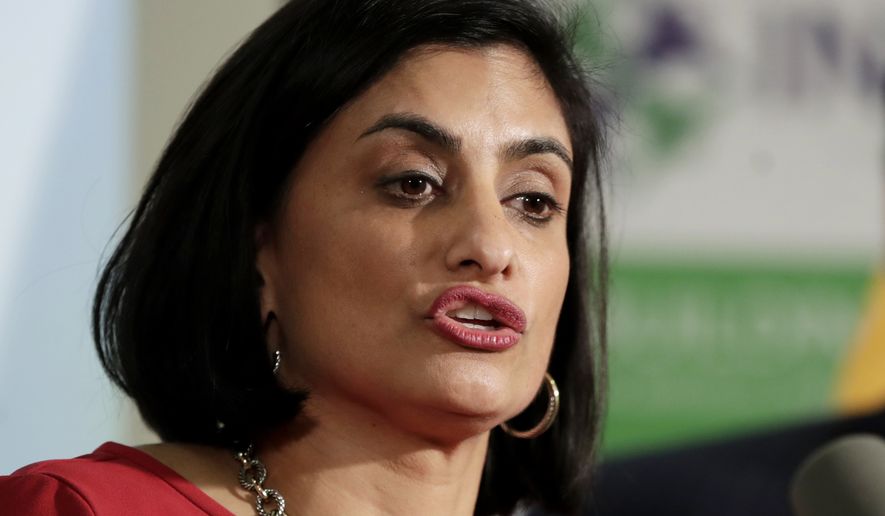The Trump administration is forming a backup plan to ensure that sicker Americans can still get insurance if a state-driven lawsuit is successful in striking down Obamacare, the chief of federal insurance programs said Tuesday.
“We do have contingency plans. We want to make sure that people with pre-existing conditions have protections, and we want to make sure that people have access to affordable coverage,” Seema Verma, administrator for the Centers for Medicare and Medicaid Services, told reporters at the American Enterprise Institute, a conservative D.C. think tank.
She declined to elaborate, saying the plans “may or may not be needed,” but the planning underscores the potential power of the lawsuit simmering in Texas.
A federal judge is expected to rule any day now on 20 Republican-led states’ request for a preliminary injunction to stop Obamacare in its tracks.
The suing states say Congress’ decision to zero out penalties tied to the law’s “individual mandate” means the law’s goodies should fall, too, including parts requiring insurers to insure people with pre-existing conditions and charge them the same price as healthier consumers.
Though it is girding for potential fallout, the Trump administration’s own Justice Department refused to defend the law in court, effectively siding with the states.
“The best contingency plan for protecting American health care — and especially for those with pre-existing conditions — is for the administration to withdraw its support for this disastrous lawsuit and instead defend the law of the land,” Protect Our Care, a pro-Obamacare group, said in response to Ms. Verma’s comments.
President Trump, who loathes his predecessor’s health law, argues protections for people with pre-existing conditions can be added back in later, if the lawsuit is successful.
Yet Democrats say Republicans cannot be trusted to preserve those protections, citing repeal-and-replace bills they wrote in 2017.
They used the potential threat as a cudgel during the midterm campaigns, and it appeared to work — Democrats swiped nearly 40 House seats and retook the majority, though remain in the Senate minority.
House Democrats say a push to reaffirm Obamacare’s protections and intervene in the Texas lawsuit will be one of the first votes they schedule in the new Congress.
Democrats will also have a freer hand to conduct oversight of the Trump administration, including its handling of Obamacare and Medicaid insurance for the poor.
Ms. Verma said her agency will do its best to respond to oversight requests from Congress. She also said she doesn’t plan on leaving her post, even if there is post-election turnover elsewhere in the administration.
“After a year and a half, I have only just gotten started,” Ms. Verma said.
Ms. Verma is a key figure in President Trump’s push to reshape insurance programs on his own, since a bitterly divided Congress is unable to agree on major changes and the Democrats’ resurgence will take Obamacare repeal off the table for another two years.
Ms. Verma said her agency will continue to process requests from states who want to use Obamacare dollars to expand Medicaid coverage to able-bodied people making slightly above poverty. Already, the administration approved a request from Virginia and is reviewing one from Maine.
“Right now it is the law, and if a state wants to expand they send us the paperwork and we’re going to process that,” she said. “This is a decision that’s being made on the state level.”
CMS is also letting states condition Medicaid benefits on seeking a job, volunteering or going to school. It’s a controversial change that’s prompted lawsuits and an outcry from patient advocates, who say Medicaid was solely designed to insure people — not lift them into jobs — and that more than 12,000 Arkansans have already lost coverage for failing to report work hours.
Ms. Verma said the administration won’t slow down its push but said she is in “constant contact” with Arkansas, which was the first state to implement work requirements.
She’s trying to figure if Arkansans are losing coverage because they chose not to comply with requirements, found a job and didn’t need Medicaid anymore or were not aware of the reporting requirements.
“We’re working with the state to evaluate what actually is going on there,” she said.
People who lose coverage are able to appeal the decision, and reports that affected persons can only report their work hours online are inaccurate, she said. They can also get reporting assistance at county offices.
Ms. Verma defended the work requirements more broadly, saying states are demanding the change and it’s the right policy to pursue amid a “booming” economy.
“There’s lots of jobs available,” she said, “and there are employers who need workers.”
• Tom Howell Jr. can be reached at thowell@washingtontimes.com.




Please read our comment policy before commenting.